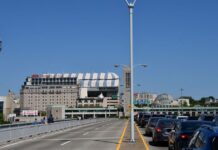People queue outside a fever clinic in Beijing on December 14, 2022, just days after the country eased its Covid controls in sub-zero temperatures in the capital.
Yuxuan Zhang | AFP | Getty Images
BEIJING — Mainland China’s rapid reversal of many Covid-related restrictions came unexpectedly suddenly, revealing a slew of new economic challenges.
Over the past two weeks, local and central government agencies have eased several measures that had forced many people to stay at home and businesses to mostly work remotely. Notably, the central government said last week that negative virus tests and health code checks are no longer required to travel domestically.
Meanwhile, reports of sick locals have increased. The city of Beijing said its fever clinics recorded 22,000 visits as of Sunday — 16 times more than a week ago.
“This reopening came quite suddenly and quite decisively. It exceeded our expectations,” said Gang Yu, co-founder and CEO of 111, an online seller of medicines and healthcare services. This is according to a CNBC translation of his comments in Mandarin.
Lack of staff and medicines
Since the end of November, orders for antipyretic products and related drugs have increased 10-fold, Yu said in a phone interview on Thursday. He said there was an “extraordinary shortage” of medicines that factories could not keep up with, a situation he expects to continue for at least three or four weeks.
Adding to the high demand, dozens of workers at 111’s warehouses or offices in different parts of China have tested positive for Covid, leading to an “extraordinary shortage” of staff, Yu said.
That’s a different challenge from earlier this year, when widespread Covid lockdowns meant thousands of new orders were stranded at various distribution points every day, Yu said.
Delivery is still slower than normal in parts of the country.
As recently as Sunday, China’s postal authority said more than 400 distribution points in Beijing and other parts of the country remained closed for Covid-related reasons.
For comparison, the Postal Service said Tuesday it collects more than 360 million packages a day — that’s more than one package per person in the United States
We anticipate that incoming migration around the Chinese New Year holiday at the end of January could lead to an unprecedented spread of Covid and severe disruption to the economy.
JD.com said on Wednesday that more than 1,000 couriers from other parts of the country had arrived in the capital, Beijing. Anecdotally, app-based food and grocery services that typically deliver within an hour have only done so at much longer intervals or next day in Beijing in recent days.
Rising infections can compensate for relaxation
“In the past two weeks, the Chinese government made a sudden 180-degree turn when it ended its zero-Covid policy, with most domestic preventive measures completely abandoned,” said Ting Lu, China’s chief economist at Nomura and A team in a report on Thursday.
“Swelling Covid infections could offset the positive effects of easing in the short term.”
“The rapid rise in infections in major cities could be just the beginning of a massive wave of Covid infections,” the analysts said.
“We expect the main activity indices to remain weak or even fall further in December. We anticipate that incoming migration around the Chinese New Year holiday at the end of January could lead to an unprecedented spread of Covid and severe disruption to the economy.”
China on Thursday reported a worse-than-expected fall in retail sales in November, along with slower growth in industrial production and fixed investment.
Get through the winter first
Social activities remain subdued amid the infection wave and freezing weather in northern cities. Traffic data from Baidu shows most people in major cities like Beijing and Guangzhou haven’t ventured out as congestion was still very low Thursday.
Management at Chinese travel booking site Trip.com was also hesitant about how quickly domestic traffic would recover.
Read more about China from CNBC Pro
“We’ve actually seen a very strong sequential increase in domestic flights and hotel reservations over the past two weeks,” they said Thursday, according to a transcript of a FactSet earnings call.
“But in the very short term, we’re still cautious as winter is typically a flat season for both business and leisure travel,” they said.
“And it could also take some time for people to weather the first wave of infections before travel demand can fully ease off and recover. But we expect a very nice recovery and growth in the domestic travel segment next year.”














